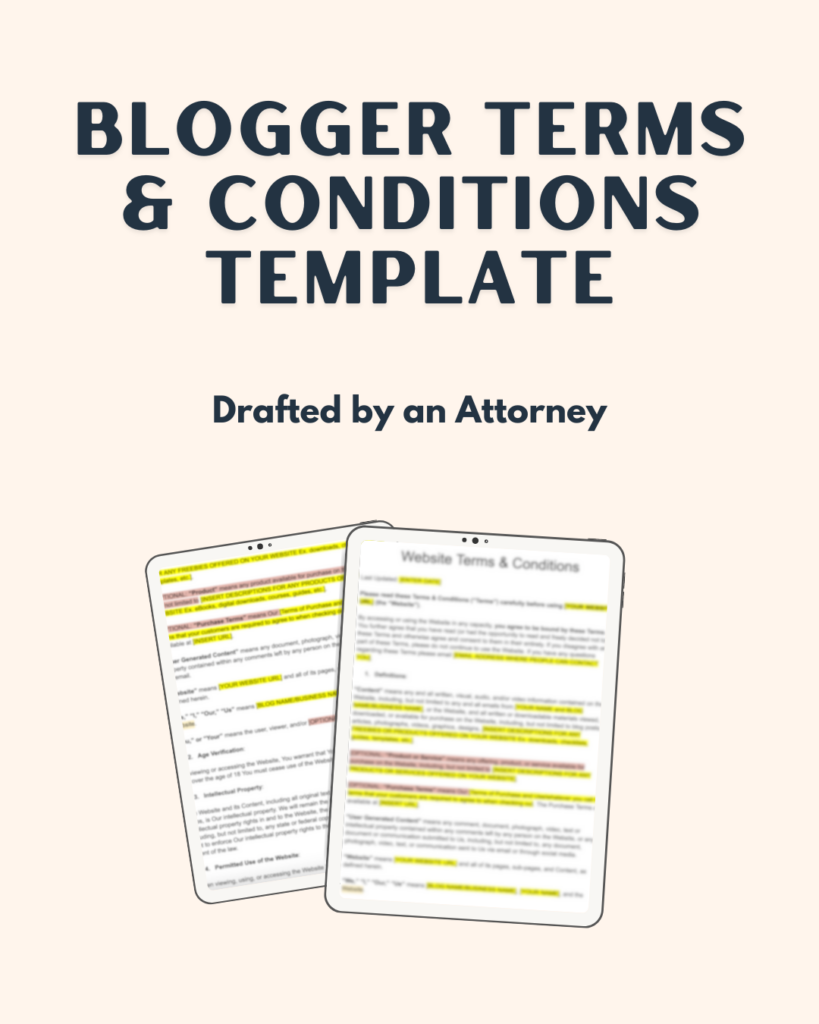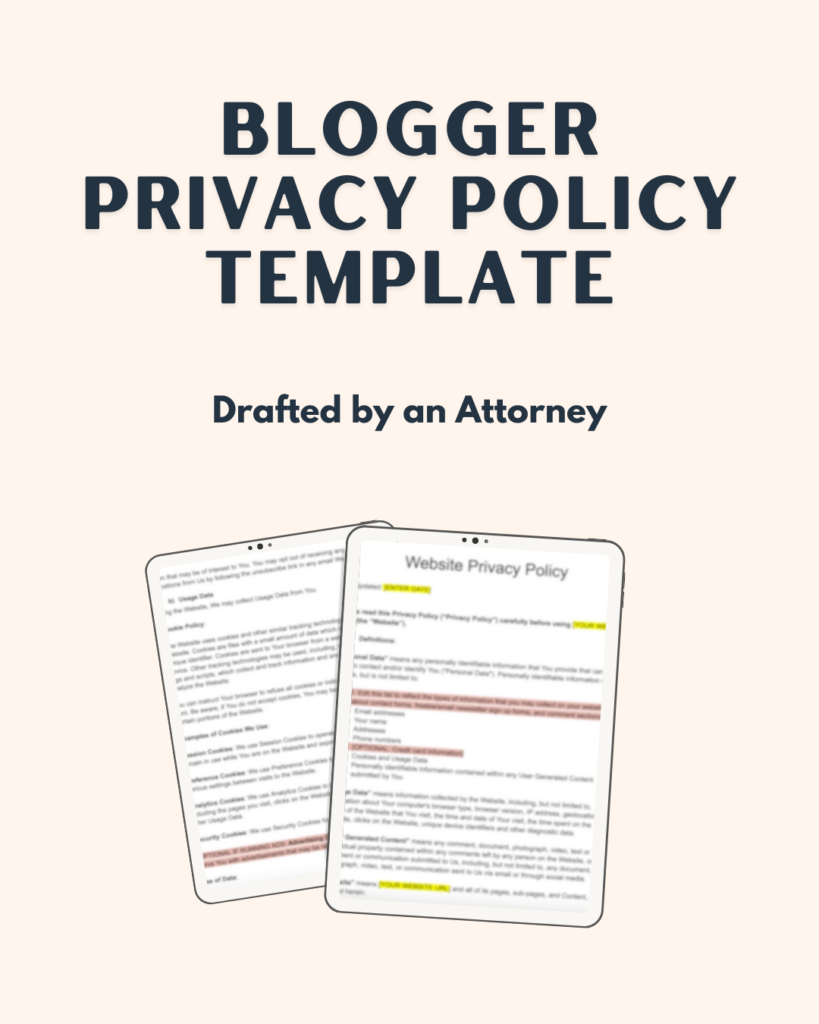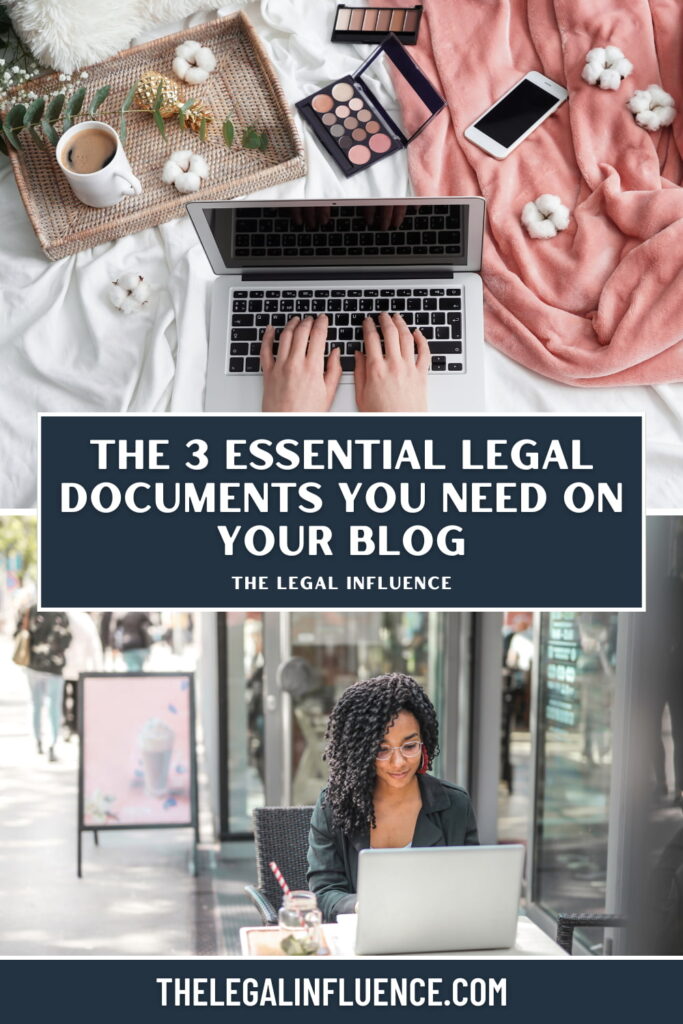The information contained in “3 Things You Need to Blog Legally in 2024“ is for informational and educational purposes only. It is not to be construed as legal advice. Reading this article or relying on information from this article does not ever create an attorney-client relationship between you and Katherine Jaquith (aka Kate Cooper). Please speak with a licensed attorney for individual advice.
Whether you’re new to blogging or have a well-established website, it’s important to make sure you blog legally. Keeping your blog legally compliant can not only help you avoid hefty fines, it also tells readers that you take your blog seriously and professionally. There are 3 legal documents that you should have on your website to cover your legal bases.
I know that dealing with the legal side of your blog can be a drag, which is why I created attorney-drafted contract templates for bloggers. Check out my Blogger Terms & Conditions Template and Privacy Policy Template to take some of the legal stress off of your plate!
Keep reading to learn more about the 3 essential documents you should have on your blog to make sure that it’s legally compliant and helps protect your business and content.

Documents You Need to Blog Legally
1. Terms and Conditions
Think of your blog’s Terms and Conditions as the guidelines for your blog. They put you in control over your website by outlining a clear framework for acceptable behavior. While having website Terms & Conditions on your blog isn’t legally required, not having them can put your intellectual property at risk and subject you to potential liability.
Here are a few reasons why it’s essential to have Terms & Conditions for your blog:
Protect Your Content:
Your Terms & Conditions should make it clear that you are the owner of any content on your blog (or have the proper rights to share third-party content). It should also clarify that you are not transferring any intellectual property rights to readers. You can also specify how people can use your content and prevent unauthorized theft or misuse.
Moderate User Conduct:
What can people do on your website? Can they leave comments on blog posts? Share your posts on social media? Download content? Your Terms & Conditions can lay out guidelines for user behavior, including commenting and using site features.
Liability Protection:
Your blog Terms & Conditions can help limit potential liability by including warranties and disclaimers. There are a number of different issues that may arise on your blog, from outdated information to disruptions in service. Your Terms & Conditions can make people aware that you aren’t responsible for these issues, and limit the amount of damages and types of claims that people may bring against your blog.
Having well-defined terms and conditions is a proactive step in ensuring that your blog and business is legally protected. If you need an attorney-drafted template, consider checking out my Blogger Terms & Conditions Template. The template is fully customizable to fit your blog’s specific needs.

2. Privacy Policy
Having a Privacy Policy on your blog is a legal requirement if you collect personal data from website visitors. Your Privacy Policy informs visitors about how you collect, store, share, and use their personal data.
Personal data can include things like names, email addresses, phone numbers, birthdays, and even IP addresses under certain laws. As a blogger, you likely collect a variety of personal data from visitors. Personal data can be collected from contact forms, email sign-ups, analytics trackers, and ad trackers and pixels, just to name a few. It’s important to make sure that your Privacy Policy accurately reflects how you manage that data.
Here’s why having a well-drafted privacy policy on your website is crucial:
Legal Compliance:
Having a Privacy Policy on your website is required by law. Be aware, there are a variety of privacy laws that exist around the world with new laws being passed regularly. However, it’s worth noting that not every law is going to apply to every website. Some laws have specific requirements that a website or business needs to meet in order to be subject to its requirements.
Other laws, like the General Data Protection Regulation (“GDPR”) apply broadly to any website that collects data from people in the EU. As previously discussed, most blogs collect personal data, so if you have traffic from the EU, you must comply with GDPR. This includes providing certain disclosures and allowing users to opt-out from having their data collected.
It is your responsibility to know what laws your blog is subject to and ensure that you have a Privacy Policy that complies with those laws. Failing to properly comply with privacy laws can lead to hefty fines.
Cookie Pop-Ups: If you collect cookies on your website (you probably do!) make sure that you have a cookie pop-up that allows people to view your Privacy Policy and give consent.
Promotes Transparency:
In addition to ensuring legal compliance, having a Privacy Policy on your website helps to build trust and promote transparency with your readers. People want to know how you’re going to use their data. Clearly explaining your data and privacy practices helps to build trust with your blog readers.
If you need a GDPR-compliant Privacy Policy check out the Blogger Privacy Policy Template from The Legal Influence. This attorney-drafted contract template is designed for newer bloggers looking to ensure their website is legally compliant.

3. Disclaimers
Having proper Disclaimers on your blog is important if you want to run your blog legally and protect yourself from liability. The type of disclaimer policies that you need on your blog depends on what you share. Here are some common types of blog disclaimers:
Affiliate Disclaimers:
If you share affiliate links on your blog, you must provide an affiliate disclaimer on your website that disclose what those links are. This helps maintain transparency with your readers, and is required by the FTC in the United States. Other countries often have their own disclosure requirements. Having a clear affiliate disclaimer policy allows you to comply with your disclosure obligations.
The purpose of an affiliate disclaimer is to make it clear you may benefit from sharing a product or recommendation. Your affiliate disclaimer should explain how the process works. For example, letting readers know that if they click on an affiliate link and make a purchase, that you will receive a commission at no additional cost to them.
When it comes to where to put your affiliate disclaimer, it needs to be clear and conspicuous. In other words, people should actually see it. Don’t hide your disclaimers.
You can include your affiliate disclaimer policy in your website footer and within your Terms & Conditions. Your affiliate disclaimer should also appear with affiliate links. The FTC suggests that the closer the disclosure is to the recommendation the better.
Content-Specific Disclaimers:
Depending on the content you share on your blog you may want (or need) to include content-specific disclaimers. For example, since The Legal Influence shares educational information on legal topics, it contains a legal disclaimer that makes it clear that I’m not providing legal advice or entering into an attorney-client relationship with readers. My ethical obligations as an attorney require me to provide this disclaimer.
There are a lot of different types of content-specific disclaimers you can make. Some examples include medical, fitness, AI, financial, business, and safety related disclaimers. The type(s) of disclaimers your website may need depends on the information you share on the site (or in the case of AI, how you create it). Including a disclaimer policy clarifies that the information you share is not professional advice and helps to limit your liability.
New to blogging or need to update your existing Terms & Conditions or Privacy Policy? Check out attorney-drafted contract templates from The Legal Influence. These templates make the legal side of blogging as straightforward as possible so you can focus on creating great content and growing a new source of income as a creator.
Listen to The Legal Influence Podcast:
Pin it for Later:


This insightful guide on essential legal documents for bloggers is incredibly helpful! A must-read for anyone looking to protect their blog and stay compliant legally.